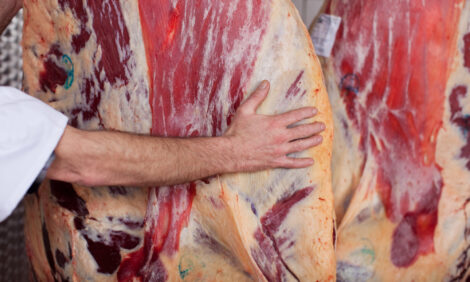



Kuke Cattle Quarantined in Botswana
BOTSWANA - Residents of Kuke settlement in Ghanzi North have welcomed government's decision to quarantine their cattle to fight the spread of foot and mouth disease and protect the neighbouring districts.Following the continued spread of the foot and mouth disease in Ngamiland district, government has proposed to temporarily put all communal cattle at Kuke into Kuke quarantine.
Speaking at a kgotla meeting at Kuke last week, the Minister of Agriculture, Mr Christian De Graaff said the ministry is concerned about cattle at Kuke settlement because of its proximity to the FMD infected area in Ngamiland.
Mr De Graaff said the disease is 9km away from Kuke fence saying the cattle are under a serious threat.
The threat is made worse by the presence of marauding elephants that are constantly damaging the fence, thereby affording cattle the opportunity to cross the fence.
According to the minister, cattle will be accepted into the quarantine from Monday 16th June until Friday 20th June.
Only cattle will be accepted at the quarantine. He said Kuke settlement will remain a cattle free-zone adding that any cattle found roaming in the area will be killed without compensation.
He said the cattle will be removed from the quarantine as soon as the FMD situation in Ngamiland is under control and those unclaimed will be handed over to Matimela.
During their stay in the quarantine, Mr De Graaff said government will provide the animals with water free of charge.
However, farmers will be responsible for the normal husbandry and care of their animals, therefore I request you to cooperate with government officials during this exercise, he said.
Mr De Graaff said in the April/May vaccination exercise, 322 000 cattle were vaccinated.
Despite this coverage, there are still some cattle that remain unvaccinated, especially in places such as Lake Ngami and others where surface water is still freely available.
Most of these animals are strays, or animals whose owners simply do not care to have them vaccinated, Mr De Graaff said.
The first outbreak was confirmed at Habu extension area in Ngamiland in October 2007. The disease, he said, has since spread to many other villages following torrential rains and massive cattle movements.
He said the government has embarked on a vigorous public education exercise on transmission and prevention exercise targeting especially travelers and farmers particularly those who farm on both sides of the fence.
Kuke residents said there is need for farmers at Ngamiland to fence their farms. They said Habu area is far from Kuke saying if their farms were fenced the disease would not have spread that far.
In response, Mr De Graaff said it is a concern adding that some farmers were allocated the farms many years ago and the farms are not fenced even today.
About concerns raised over the effectiveness of the vaccine in controlling the disease, Mr De Graaff said his ministry has constituted a team of experts to investigate the problem in detail.
This work will start at the end of June or early July 2008.
However, he said farmers must also play their part in bringing forth their cattle for vaccination and restricting their cattle movement.
Further Reading
|
|
- You can visit our FMD information page by clicking here. |
TheCattleSite News Desk


